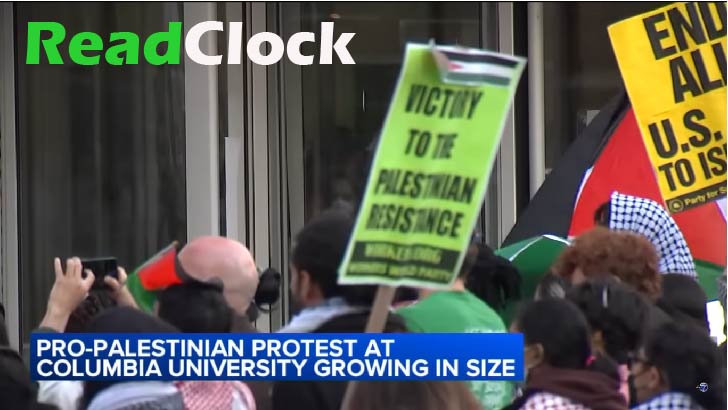New York’s Columbia University — an Ivy League school that prides itself on being the “finest liberal arts college in the US” — has become a hotbed of pro-Palestine protests after being thrust into the limelight due to the suspension and subsequent arrest of over a 100 protesting Columbia University and Barnard College students.
On April 17, students against Israel’s aggressive military offensive in Gaza established a “Gaza Solidarity Encampment” on school grounds. The demonstrating students, part of the Columbia University Apartheid Divest — a coalition of over 100 student groups from various institutions — attempted to raise calls for the varsity to financially divest from companies and institutions that “profit from Israeli apartheid, genocide, and occupation in Palestine.”
What happened?
On Thursday, around 108 demonstrating students, including Jewish students, and Minnesota Congresswoman and Democratic Party member Ilhan Omar’s daughter Isra Hirsi, who is a student at Barnard, were suspended and eventually arrested on the grounds of “trespassing”.
Columbia University President Dr Nemat Talaat “Minouche” Shafik requested the New York Police Department to “remove” student protesters in a letter. “More than 100 individuals currently occupy the South Lawn of Columbia University’s Morningside Heights campus. This group has been informed numerous times and in writing that they are not permitted to occupy this space, violate the University’s rules and policies, and must disperse. All University students participating in the encampment have been informed they are suspended. At this time, the participants in the encampment are not authorized to be on University property and are trespassing,” the letter read.
The protests, disciplinary action, and arrests came a day after Shafik’s testimony at a Congress hearing about growing antisemitism on campus. According to a CNN report, “confrontations on campus” sparked condemnation from the White House and New York officials.
“The students that were arrested were peaceful, offered no resistance whatsoever, and were saying what they wanted to say peacefully,” the outlet quoted NYPD Chief of Patrol John Chell as saying.
However, fourth-year Columbia student Maryam Alwan, who helped organize the protest, in a televised MSNBC interview, said, “We were arrested on the grounds of trespass, meaning that we would’ve had to have been suspended to be trespassing onto our campus but the suspension letter said that you are suspended for violation of the law because you were arrested for trespassing so it doesn’t even make sense and feels like it’s part of a repressive campaign against Palestine advocacy that has been ongoing for months now.”
Accompanying Alwan for the interview, Hirsi noted, “This was expected, we knew the risks and we knew what we were engaging in. However, I wasn’t expecting to be locked out of my dorm and campus as quickly as I was.”
The protests have now spread to other campuses, including Yale and MIT. Police arrested dozens of people at the demonstrations at Yale in Connecticut and New York University in Manhattan, according to Reuters.
From Yale, 60 people, including at least 47 student protesters, were arrested for trespassing after they blocked traffic around campus, according to a statement by Yale University President Peter Salovey issued on Monday. Several protesters were also arrested from NYU.
Hundreds of faculty members at Columbia also held a mass walkout on Monday to protest Shafik’s decision to have police arrest students on campus.
Exposing double standards
The university protests have become a flashpoint in the Palestinian liberation movement in the US and the response to the protests has exposed a troubling double standard in both the media coverage and the way the protests have been handled.
Much of the media coverage has highlighted the impact on Jewish students and communities as opposed to focusing on the protesters’ demands or the reasons for demonstrations.
A CNN report on the crisis at the varsity ahead of the Jewish holiday Passover on Monday detailed a rabbi’s call to Jewish students on campus, urging them to stay home amid “tense confrontations,” but failed to give a single instance of antisemitism, harassment, or violence perpetrated against any Jewish student by another student at Columbia.
It makes a case for university officials’ testimonies about antisemitism on campus being a direct consequence of the pro-Palestinian protests on and near campus. Still, it makes no mention of the suspended Jewish students who were part of the encampment protests.
These students described the “discriminatory, repressive and unsafe conditions” they faced for protesting at the liberated zone at Columbia University in an open letter shared by Jewish Voice for Peace. The letter highlights how the suspension obstructed their religious observances during Shabbat and left them homeless on the religious holiday.

